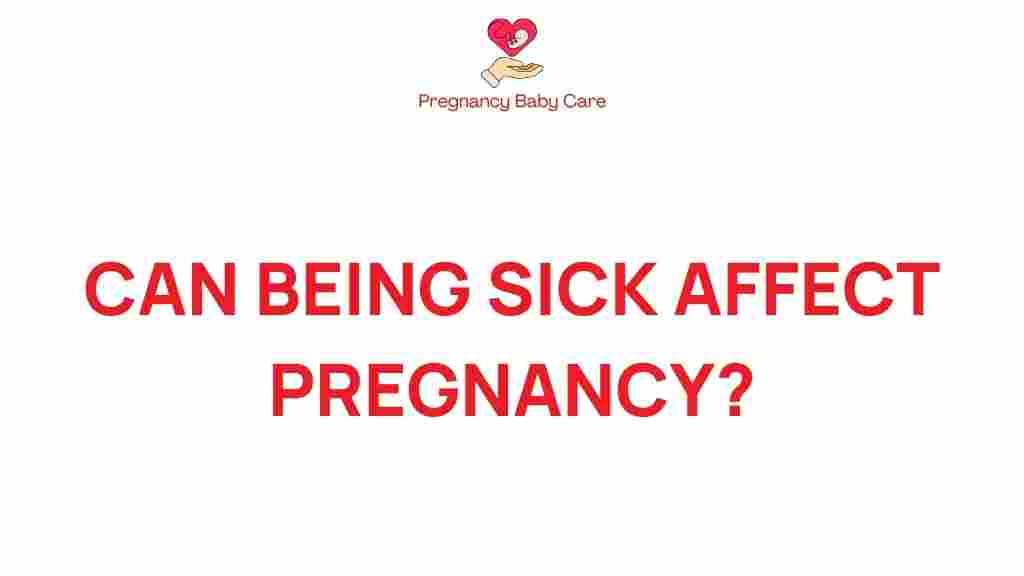Can Illness Impact Your Pregnancy Journey? Discover the Facts
Pregnancy is a beautiful journey that brings a myriad of changes to a woman’s body, mind, and life. However, it can also come with challenges, especially when illness strikes. Understanding how various illnesses can impact pregnancy is crucial for maternal wellness and the health of the developing fetus. In this article, we will explore the relationship between illness and pregnancy, discuss potential complications, and emphasize the importance of prenatal care and medical advice.
The Connection Between Illness and Pregnancy
Illness during pregnancy can affect not just the mother but also the fetus. Many factors come into play, including the type of illness, the timing during pregnancy, and the overall health of the mother. Here are some key points to consider:
- Immune System Changes: Pregnancy triggers changes in a woman’s immune system to protect the developing fetus. These changes can make pregnant women more susceptible to certain illnesses.
- Chronic Conditions: Conditions such as diabetes, hypertension, and autoimmune disorders can complicate pregnancy if not managed properly.
- Infectious Diseases: Illnesses like influenza, COVID-19, and other infections can pose serious risks to both maternal health and fetal development.
Common Illnesses Affecting Pregnancy
Several illnesses can impact pregnancy. Here’s a closer look at some common conditions:
- Flu and Other Viral Infections: These can lead to severe respiratory issues and complications if contracted during pregnancy.
- COVID-19: Evidence shows that pregnant women may be at increased risk of severe illness from COVID-19.
- Gestational Diabetes: This condition develops during pregnancy and can affect fetal development if not managed.
- Hypertension: High blood pressure can lead to preeclampsia, a serious condition that can affect both mom and baby.
- Autoimmune Diseases: Conditions like lupus can pose additional risks during pregnancy and require careful management.
Impact on Fetal Development
Illness in the mother can significantly impact fetal development. Here are some ways this can happen:
- Medication Effects: Some medications for maternal illnesses can have teratogenic effects, affecting fetal growth and development.
- Nutritional Deficiencies: Illness can affect a mother’s appetite and nutrient absorption, leading to deficiencies that impact fetal health.
- Stress and Mental Health: Chronic illness can increase stress levels, which in turn can affect fetal development and maternal health.
Importance of Prenatal Care
Regular prenatal care is vital for monitoring the health of both mother and baby, especially when illness is present. Here’s why:
- Early Detection: Routine check-ups can help identify potential complications early on, allowing for timely intervention.
- Managing Chronic Conditions: Healthcare providers can help manage chronic illnesses to minimize risks to the pregnancy.
- Personalized Care Plans: A tailored care plan can address specific health needs and concerns throughout pregnancy.
Seeking Medical Advice
When illness arises during pregnancy, seeking medical advice is crucial. Here are steps to take:
- Consult Your Healthcare Provider: Always discuss any illness with your doctor, especially if you are pregnant.
- Follow Treatment Plans: Adhering to prescribed treatments can help manage symptoms and reduce risks.
- Stay Informed: Educate yourself about your illness and its implications for pregnancy. Reliable sources, such as the CDC, provide valuable information.
- Prioritize Health: Make lifestyle changes that promote health, such as a nutritious diet, regular exercise (as advised), and stress management techniques.
Complications to Watch For
Illness can lead to several complications during pregnancy. Being vigilant about these can help in their early detection:
- Preeclampsia: High blood pressure and protein in the urine can develop, requiring careful monitoring.
- Preterm Labor: Certain illnesses can increase the risk of delivering before the due date.
- Low Birth Weight: Illness can impact fetal growth, leading to lower than normal birth weight.
- Infections: Some illnesses can increase the risk of infections that may affect the mother and baby.
Tips for Maintaining Maternal Wellness
To support health during pregnancy, especially when illness is present, consider these tips:
- Nutrition: Focus on a balanced diet rich in vitamins and minerals to support both maternal and fetal health.
- Hydration: Drink plenty of fluids to stay hydrated, which helps in overall health and wellness.
- Rest: Ensure adequate rest to help your body recover and maintain energy levels.
- Support System: Lean on family and friends for emotional support, which is crucial for mental health.
- Exercise: Engage in safe physical activity, as advised by your healthcare provider, to boost mood and energy.
Conclusion
Illness can have significant implications for pregnancy, affecting both maternal and fetal health. Understanding these impacts and prioritizing prenatal care is essential for a healthy pregnancy journey. Always seek medical advice when illness arises, and actively manage your health through proper nutrition, exercise, and support. Remember, your health is paramount, and with the right care and attention, you can navigate your pregnancy journey successfully, even in the face of illness.
For more resources on maternal wellness and pregnancy health, check out our other articles on health and wellness during pregnancy.
This article is in the category Pregnancy and created by PregnancyBabyCare Team
